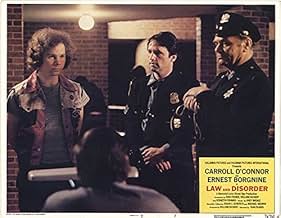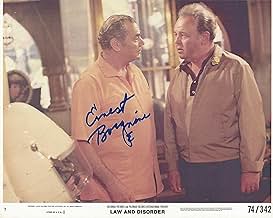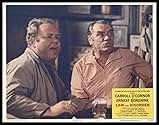Agrega una trama en tu idiomaIn crime-ridden 1970s New York City, cops Willie and Cy have had enough. Along with other disgruntled people, they decide to take matters into their own hands - only to realize too late that... Leer todoIn crime-ridden 1970s New York City, cops Willie and Cy have had enough. Along with other disgruntled people, they decide to take matters into their own hands - only to realize too late that they're in over their heads.In crime-ridden 1970s New York City, cops Willie and Cy have had enough. Along with other disgruntled people, they decide to take matters into their own hands - only to realize too late that they're in over their heads.
- Dirección
- Guionistas
- Elenco
Joseph Ragno
- Peter
- (as Joe Ragno)
Edward Grover
- Capt. Malloy
- (as Ed Grover)
William Richert
- Desk Sergeant
- (as Bill Richert)
- Dirección
- Guionistas
- Todo el elenco y el equipo
- Producción, taquilla y más en IMDbPro
Opiniones destacadas
This is truly one of the best serio- comedies I have ever see! The edited version shown rarely on TV does not do this film justice. If you haven't seen the un-edited version, you're missing an outstanding film. I have been looking for this film for over 20 years, but no luck. I would love to see it again, but it is on "moratorium."
Carroll O'Connor and Ernest Borgnine were two of the biggest stars in 1974. Even though Borgnine was ever-enshrined as Lt. Commander Quinton McHale, on his hugely successful TV sitcom, McHale's Navy (1962-1966), since then, he had been more prevalent and busy, with his successful film career up to this point, with huge film hits like the Dirty Dozen (1967), the Wild Bunch (1969), and the Poseidon Adventure (1972). O'Connor was, of course, enjoying the success of his hugely popular TV sitcom, All in the Family (1971-1979), that was beginning its season five, when Law and Disorder (1974), was released in theaters. This film utilized those popular aspects, that made these two guys famous, especially Archie's parenting/husband skills and McHale's ability, to lead miscreants into battle. They also are synonymous with comedy, so Law and Disorder (1974), immediately establishes itself as a comedy-drama, about two New York City guys, Cy, the hair-stylist (Borgnine) and Willie, the cabdriver (O'Connor).
Ann Wedgeworth plays O'Connor's wife, Sally. Karen Black plays Gloria, who works with Cy at the hair salon. She's nuts in this movie. Unfortunately, her character felt a little bit over-the-top, but if crazy is what the director, Ivan Passer wanted, he got that successfully. Alan Arbus has a small role in the film too. He's most famous for being Dr. Sydney Freeman on the highly successful TV-Sitcom, M*A*S*H (1972-1983). He plays a psychologist in Law and Disorder (1974), which is, almost, the same occupation as Dr. Freeman, already in his reoccurring, third season on M*A*S*H (1972-1983). Law and Disorder (1974), is a dark-comedy, with a hodgepodge of interesting characters, not really attempting to get you to like them, so don't look for anything, like character appreciation or vicarious inspiration. They are just trying to live their lives in the urban streets of 1970s New York.
After a slew of clever robberies, home-invasions, as well as, an old trench-coat flasher, the people of this New York City neighborhood, ask to join the civilian-led, Police Auxiliary Force, in order to help enforce the laws. Alan Arbus' Dr. Richter, has to teach a class-lecture on rape, to the new Police Auxiliary Force recruits. It's a comedy crime-drama, with a lot of 1970s street-talk. Being as it is the early 1970s, with a story about out-of-control, street crime, Law and Disorder (1974), does have sign-of-the-times humor and situations, that may be too intense for some sensitive, 21st century viewers. It is after all, rated-R for a reason, so keep the kids out of the room when watching this film. As Cy and Willie get their squad together, the film begins to resemble Police Academy (1984), which makes both men think, they may have made a huge mistake with this idea. But, despite that, they push along. The film starts to turn a little dramatic and dark in the last third of the story, with an ending I wasn't expecting.
PMTM Grade: 6.7 (C-) = 7 IMDB.
Ann Wedgeworth plays O'Connor's wife, Sally. Karen Black plays Gloria, who works with Cy at the hair salon. She's nuts in this movie. Unfortunately, her character felt a little bit over-the-top, but if crazy is what the director, Ivan Passer wanted, he got that successfully. Alan Arbus has a small role in the film too. He's most famous for being Dr. Sydney Freeman on the highly successful TV-Sitcom, M*A*S*H (1972-1983). He plays a psychologist in Law and Disorder (1974), which is, almost, the same occupation as Dr. Freeman, already in his reoccurring, third season on M*A*S*H (1972-1983). Law and Disorder (1974), is a dark-comedy, with a hodgepodge of interesting characters, not really attempting to get you to like them, so don't look for anything, like character appreciation or vicarious inspiration. They are just trying to live their lives in the urban streets of 1970s New York.
After a slew of clever robberies, home-invasions, as well as, an old trench-coat flasher, the people of this New York City neighborhood, ask to join the civilian-led, Police Auxiliary Force, in order to help enforce the laws. Alan Arbus' Dr. Richter, has to teach a class-lecture on rape, to the new Police Auxiliary Force recruits. It's a comedy crime-drama, with a lot of 1970s street-talk. Being as it is the early 1970s, with a story about out-of-control, street crime, Law and Disorder (1974), does have sign-of-the-times humor and situations, that may be too intense for some sensitive, 21st century viewers. It is after all, rated-R for a reason, so keep the kids out of the room when watching this film. As Cy and Willie get their squad together, the film begins to resemble Police Academy (1984), which makes both men think, they may have made a huge mistake with this idea. But, despite that, they push along. The film starts to turn a little dramatic and dark in the last third of the story, with an ending I wasn't expecting.
PMTM Grade: 6.7 (C-) = 7 IMDB.
Basically this was a film about a couple of blue collar NYC guys that are fed up with their city. They are great friends and organize an auxiliary police force. Getting caught up in this venture, they take this way too seriously and like to believe they are real cops. Gradually , they become out of control. This film had some of the funniest moments but out of nowhere, reality would hit. I liked the film and felt it was a very creative effort. Some wonderful scenes featuring Karen Black , in what may have been her best performance, as an over the top hairdresser. You also had an actor named J. Frank Lucas as a flasher who was funny. Perhaps the best character in the film was Gary Springer billed as the F.U. Kid. I am not making this up folks. It is right here on IMDb. The couple scenes Mr. Springer participated, were worth the price of admission, back in the day. In summation, I would say this is a dramady , with more emphasis on comedy than drama. Be prepared for some harsh moments and appreciate the great comic moments, of which there are many.
I thought this was a decent film; not a classic, but entertaining enough. The basic premise for me is that sometimes you get in over your head trying to be something that you are not. Guess you'd call this a dark comedy. Excellent acting, gritty scenes of New York life when it wasn't so pleasant, and a shockingly brutal ending makes this worth a look.
It has been many years since I saw this on TV. Two regular Working class Joe's, Ernest Borgnine and Carrol O'Connor, decide to formulate their own Volunteer Police force in their NYC neighborhood. Fed up with the rampant crime that pervades their area, both of these two buddies eventually learn they are in over their heads.
Carrol O'Connor is always entertaining, especially when he rides on the Coattails of his famed character from "All in the Family" in a more subtle version. It's really hard to shake off that character, especially in 1974 when the sitcom had reached the height of its popularity.And with his equally tough and gruff friend, Ernest Borgnine, we are hoping these two will become heroic bad ass renegades that make a difference in cleaning up the streets. But things just don't turn out that way. Willie, Carrol O'Connor, gets discouraged by the job too soon before his irascible partner (Cy), Ernest Borgnine, grows increasingly frustrated into madness. The casting of these two is correct. But here their chemistry barely makes this drab film watchable. Unfortunately, O'Connor's wife is played by a much younger woman, Ann Wedgeworth, surpassing credulity. And would you accept Ernest Borgnine as a beautician? The crusty old-school humor with personal barbs, racial epithets and vulgarity may put off modern audiences. This forgotten film is a product of its time.
Several scenes and one liners are memorable, but the treatment of the subject matter is too farcical to be taken seriously. A scene in a diner with Willie and his wife is inappropriately downbeat and bizarre. An awakening moment occurs when the buddy wannabee cops are driving the town in their makeshift patrol car. Cy notices a nearby crime scene, "hey let's go handle it. we're cops now aren't we?" "I don't know what the hell we are!", exclaims a confused Willie. And this is where the hope for an adventurous drama goes downhill. The supporting cast is filled with farcical caricatures which undermines the severity of the situation the main characters are in, leaving us duped and soured by the outcome of the final scenes. This was a strange attempt for a Black comedy that didn't quite fly.
¿Sabías que…?
- TriviaCo-stars Carroll O'Connor and Ernest Borgnine would eventually have the shared distinction that for each, one of their most popular roles had been originated by Rod Steiger. In the live TV anthology series The Philco Television Playhouse (1948), Steiger had first played the role of Marty Pilletti in Marty (1953), later played by Borgnine winning the Best Actor Academy Award for Marty (1955). Steiger would later win his own Best Actor Academy Award for playing Chief Bill Gillespie in Al calor de la noche (1967), a role that--when the movie was adapted as the long-running TV series In the Heat of the Night (1988), starting its run more than two decades after the original film--would be played by O'Connor, that casting occurring 14 years after this film, at a time when O'Connor was already at his peak of popularity with another iconic television role, that of Archie Bunker on All in the Family (1971).
- Versiones alternativasIn the Anchor Bay DVD/VHS release, the scene where Cy shows Willie the hot police car he bought is cut a bit. In the original theatrical version, after Cy shows Willie the siren, Cy then shows Willie some stickers he is going to put on the car to make it look like an authentic police car, this part is missing in the home versions.
- ConexionesFeatured in Trailer Trauma V: 70s Action Attack! (2020)
Selecciones populares
Inicia sesión para calificar y agrega a la lista de videos para obtener recomendaciones personalizadas
- How long is Law and Disorder?Con tecnología de Alexa
Detalles
- Fecha de lanzamiento
- País de origen
- Idioma
- También se conoce como
- Grand Street
- Locaciones de filmación
- Delancey Street, Manhattan, Nueva York, Estados Unidos(Willie's argument with bus driver, at Suffolk Street intersection)
- Productoras
- Ver más créditos de la compañía en IMDbPro
Taquilla
- Total en EE. UU. y Canadá
- USD 1,597,866
- Tiempo de ejecución1 hora 41 minutos
- Mezcla de sonido
- Relación de aspecto
- 1.85 : 1
Contribuir a esta página
Sugiere una edición o agrega el contenido que falta

Principales brechas de datos
By what name was Law and Disorder (1974) officially released in India in English?
Responda


































